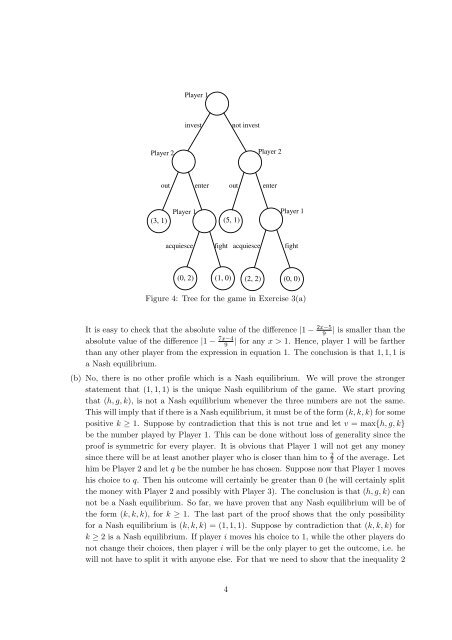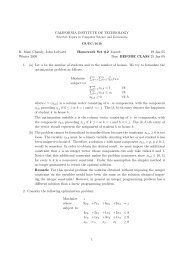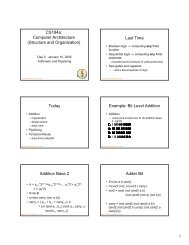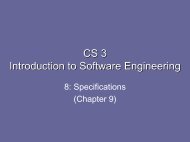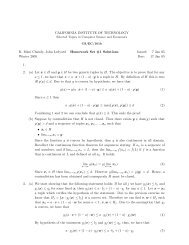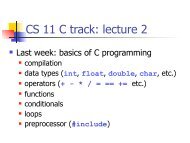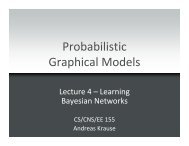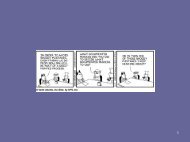Homework 3 Solutions - Caltech
Homework 3 Solutions - Caltech
Homework 3 Solutions - Caltech
You also want an ePaper? Increase the reach of your titles
YUMPU automatically turns print PDFs into web optimized ePapers that Google loves.
Player 1<br />
invest<br />
not invest<br />
Player 2<br />
Player 2<br />
out enter out enter<br />
(3, 1)<br />
Player 1<br />
(5, 1)<br />
Player 1<br />
acquiesce<br />
fight<br />
acquiesce<br />
fight<br />
(0, 2)<br />
(1, 0)<br />
(2, 2) (0, 0)<br />
Figure 4: Tree for the game in Exercise 3(a)<br />
It is easy to check that the absolute value of the difference |1 − 2x−5<br />
9<br />
| is smaller than the<br />
absolute value of the difference |1 − 7x−4<br />
9<br />
| for any x > 1. Hence, player 1 will be farther<br />
than any other player from the expression in equation 1. The conclusion is that 1, 1, 1 is<br />
a Nash equilibrium.<br />
(b) No, there is no other profile which is a Nash equilibrium. We will prove the stronger<br />
statement that (1, 1, 1) is the unique Nash equilibrium of the game. We start proving<br />
that (h, g, k), is not a Nash equilibrium whenever the three numbers are not the same.<br />
This will imply that if there is a Nash equilibrium, it must be of the form (k, k, k) for some<br />
positive k ≥ 1. Suppose by contradiction that this is not true and let v = max{h, g, k}<br />
be the number played by Player 1. This can be done without loss of generality since the<br />
proof is symmetric for every player. It is obvious that Player 1 will not get any money<br />
since there will be at least another player who is closer than him to 2 3<br />
of the average. Let<br />
him be Player 2 and let q be the number he has chosen. Suppose now that Player 1 moves<br />
his choice to q. Then his outcome will certainly be greater than 0 (he will certainly split<br />
the money with Player 2 and possibly with Player 3). The conclusion is that (h, g, k) can<br />
not be a Nash equilibrium. So far, we have proven that any Nash equilibrium will be of<br />
the form (k, k, k), for k ≥ 1. The last part of the proof shows that the only possibility<br />
for a Nash equilibrium is (k, k, k) = (1, 1, 1). Suppose by contradiction that (k, k, k) for<br />
k ≥ 2 is a Nash equilibrium. If player i moves his choice to 1, while the other players do<br />
not change their choices, then player i will be the only player to get the outcome, i.e. he<br />
will not have to split it with anyone else. For that we need to show that the inequality 2<br />
4


